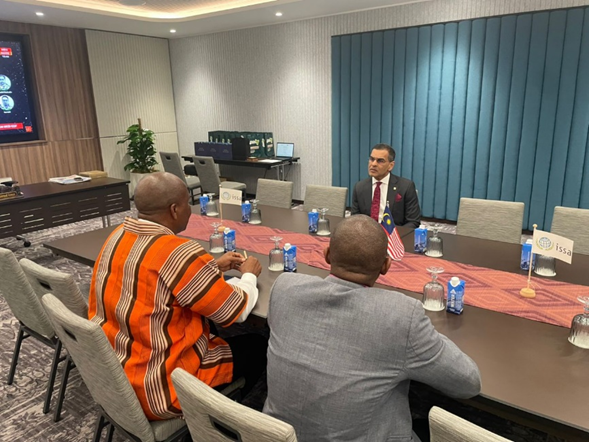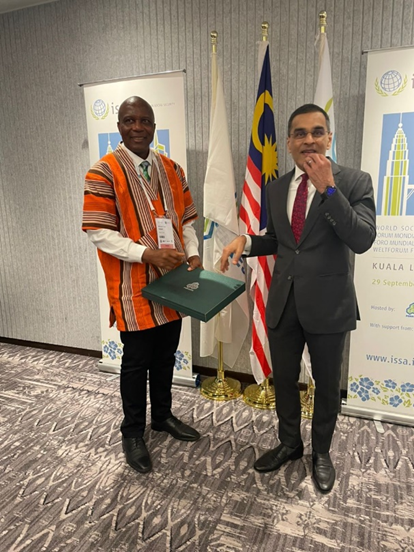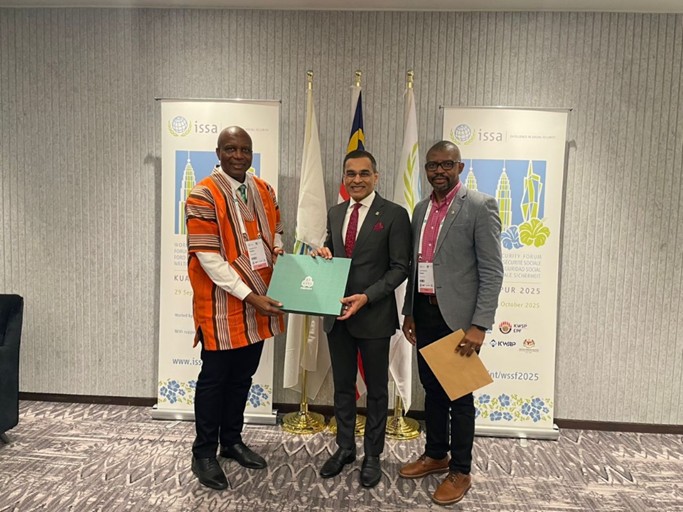By Mackie M. Jalloh
Kuala Lumpur, Malaysia
When Mohamed Fuaad Daboh, Director General of the National Social Security and Insurance Trust (NASSIT), took the floor at the World Social Security Forum in Kuala Lumpur, his message was simple yet powerful: no social protection system can thrive without good governance, digital innovation, and inclusion.
Speaking during a high-level panel on the ISSA Guidelines on Good Governance, Mr. Daboh drew attention to Sierra Leone’s ongoing transformation of its social security architecture. He explained that governance reform, transparency, and technological modernization were now central to NASSIT’s operations, positioning the Trust as a regional model for resilience and accountability.

“Good governance builds credibility. It inspires confidence among contributors and ensures that every payment, every process, and every promise is backed by integrity,” Daboh told the international audience of ministers, experts, and policymakers. “We have made it a duty at NASSIT to ensure that systems work — not only for today’s contributors but for future generations.”
The NASSIT Director General outlined several groundbreaking reforms underway within the institution. Among these, he cited the roll-out of a web-based Pension Administration System, the launch of a biometric registration platform, and comprehensive data-cleaning efforts aimed at removing inconsistencies and “ghost pensioners” from the payroll.
“These measures will make pension management more transparent, efficient, and fraud-resistant,” Daboh said. “Biometric verification will not only protect pensioners but also improve service delivery and eliminate manual bottlenecks that have long plagued public trust systems.”

He acknowledged that while Sierra Leone’s ICT infrastructure still faces challenges, NASSIT’s digital roadmap is designed to overcome them through automation, improved data analytics, and integrated information systems — all key to building a sustainable, people-centered institution.
Daboh also used the international platform to spotlight one of Sierra Leone’s most ambitious social reforms: extending social protection to informal workers. He disclosed that NASSIT, in collaboration with the International Labour Organisation (ILO) and the Attorney General’s Office, had drafted a bill to establish a Social Insurance Scheme for the Informal Sector — a group that represents over 80% of Sierra Leone’s labor force.
“This initiative reflects our belief that no worker should be left behind,” he said. “Informal sector workers deserve the same safety net as those in the formal economy. The bill, once enacted, will mark a historic expansion of coverage and fairness in Sierra Leone’s social protection landscape.”
Daboh further highlighted the establishment of a Social Security Court by Sierra Leone’s Judiciary to handle NASSIT-related compliance and dispute cases. He noted that such institutional mechanisms promote fairness, ensure adherence to the NASSIT Act, and reinforce trust among contributors and beneficiaries.
He emphasized that clear benefit formulae and eligibility criteria — communicated through digital platforms, brochures, and stakeholder engagement — were essential in building predictability and stability in the system. “Our contributors must know that the rules are transparent and the outcomes are certain,” he said.
Despite the nation’s economic challenges, Daboh reaffirmed NASSIT’s unwavering commitment to timely and regular pension payments. “Pensioners depend on predictability,” he remarked. “Even in difficult economic periods, we have ensured payments are made without delay, because the dignity of retirees is non-negotiable.”
Beyond the plenary sessions, Daboh engaged in bilateral and multilateral discussions with global partners, including the leadership of the International Social Security Association (ISSA), exploring strategic cooperation for the Salone Informal Sector Pension Scheme.
The World Social Security Forum — organized by ISSA and hosted by Malaysia’s Social Security Organisation (PERKESO) from September 29 to October 3, 2025 — gathered world leaders, policymakers, and social security professionals to discuss the future of social protection in the face of rapid economic and technological change.
Key outcomes of the forum underscored the importance of digitalisation, inclusion, and data-driven policy in achieving resilient systems. Delegates also pledged stronger collaboration across regions to ensure that governance standards are not just adopted but translated into real, measurable impact.
As Daboh concluded his intervention, his message resonated with many in attendance: governance, technology, and inclusivity are not mere administrative goals — they are the foundation for dignity, fairness, and the future of social security.



